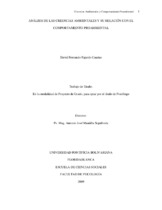Mostrar el registro sencillo del ítem
Análisis de las creencias ambientales y su relación con el comportamiento proambiental
| dc.contributor.advisor | Mantilla Sepúlveda, Antonio José | |
| dc.contributor.author | Fajardo Cuartas, David Fernando | |
| dc.coverage.spatial | Seccional Bucaramanga. Universidad Pontificia Bolivariana. Escuela de Ciencias Sociales. Facultad de Psicología | spa |
| dc.coverage.temporal | 2009 | |
| dc.date.accessioned | 2013-07-16T21:53:53Z | |
| dc.date.available | 2013-07-16T21:53:53Z | |
| dc.date.created | 2009-10-21 | |
| dc.date.issued | 2013-07-16 | |
| dc.identifier.uri | http://hdl.handle.net/20.500.11912/570 | |
| dc.description | 137p.: (pdf); il; tablas | spa |
| dc.description.abstract | El objetivo de este estudio fue analizar las creencias ambientales y su relación con el comportamiento proambiental en los estudiantes de 6º a 8º semestre de la Universidad Pontificia Bolivariana seccional Bucaramanga. Este fue un estudio correlacional causal, donde se aplicaron las escalas de «conductas protectoras del ambiente» y «creencias ambientales» a 324 estudiantes; donde se analizaron los datos a través de análisis factorial confirmatorio. Respecto a las creencias ambientales, se encontró que la muestra evaluada, en su mayoría, comprende el medio ambiente como una entidad que está en armonía, igualdad y regularidad con ellos y los seres humanos, puesto que la creencia ecocéntrica es la que más comparten. Además, se encontró un sistema de creencias dual, es decir, no comparten creencias ambientales diferentes: unos estudiantes –la mayoría– comprenden la naturaleza bajo los principios que establece la creencia de ecocentrismo (armonía, regularidad e igualdad), mientras otros, diferente a los anteriores, comprenden la naturaleza bajo los principios que plantean las creencias de antropocentrismo y progreso (una entidad inferior a los seres humanos y un recurso a explotar ilimitadamente). Otro resultado, es que el progreso de los seres humanos es entendido desde una visión antropocéntrica (centrada en el hombre) al margen de una consideración ambiental sostenible. Sobre las correlaciones entre las creencias ambientales y el comportamiento proambiental, se encontró que ecocentrismo es la única creencia que disposiciona esta variable comportamental: visiones de la naturaleza bajo los principios ecocéntricos son los únicos que desarrollan comportamientos proambientales, y visiones de la naturaleza bajo principios de progreso y antropocentrismo impiden el desarrollo de esta variable comportamental. Se sugiere revisar los enfoques de progreso como se están enseñando en las diferentes carreras profesionales, porque se plantea la hipótesis que puedan estar enfocadas desde visiones antropocéntricas (alejado de una consideración sostenible y ambiental). | spa |
| dc.description.abstract | The objective of this study was to analyze the environmental believes systems and their possible correlation with the proenvironmental behavior among students from 6th to 8th semester in the Pontificia Bolivariana University from Bucaramanga city, Colombia. It was a casual correlation kind of study, in which was applied to 324 students, two different scales of measurement: The “Protective Environmental Behavior Scale” and the “Environmental Behavior Scale”. About the analysis of believes systems, it is found that most of the evaluated sample understand the environmental like an entity which is in harmony and regularity with the Human beings, because the ecocentric belief is the most shared. As well, the study show a dual believes system, that is known to be that some students do not share different environmental believes from the other students, as ones understand the principles established by the ecocentrism belief (harmony, regularity and equality), others understand the environmental as an accord to the principles established by the anthropocentric and progress believes (an entity considering lower than the human beings and an environmental resource that can be exploited unlimitedly). Another result found, is that the environmental progress is understood as an anthropocentric vision (centered in men) outside of a sustainable environmental consideration. About the correlation of the environmental believes and the proenvironmental behavior, the study show an ecocentrism belief as the only one provided as a proenvironmental behavior, it can be explained by the fact that all visions focus to the nature are based on ecocentrism principles and that is the way to develop a proenvironmental behavior, and opposite to this view are the principles of progress and anthropocentrism. Finally, the analysis of the study suggests that all the approaches of progress that are applying on the different areas of study at the university, should be review to avoid of being an anthropocentric vision. | spa |
| dc.language.iso | es | |
| dc.publisher | Universidad Pontificia Bolivariana | spa |
| dc.rights | Attribution-NonCommercial-NoDerivatives 4.0 International | * |
| dc.rights.uri | http://creativecommons.org/licenses/by-nc-nd/4.0/ | * |
| dc.subject | Tesis y disertaciones académicas | spa |
| dc.subject | Psicología | spa |
| dc.subject | Aula - medio ambiente | spa |
| dc.title | Análisis de las creencias ambientales y su relación con el comportamiento proambiental | spa |
| dc.type | bacherlorThesis | spa |
| dc.rights.accessRights | openAccess | spa |
| dc.type.hasVersion | publishedVersion | spa |
| dc.identifier.instname | instname:Universidad Pontificia Bolivariana | spa |
| dc.identifier.reponame | reponame:Repositorio Institucional de la Universidad Pontificia Bolivariana | spa |
| dc.identifier.repourl | repourl:https://repository.unab.edu.co/ |
Ficheros en el ítem
Este ítem aparece en la(s) siguiente(s) colección(ones)
-
Trabajos de grado [6055]
Monografías, artículos, informes, proyecto de grado


